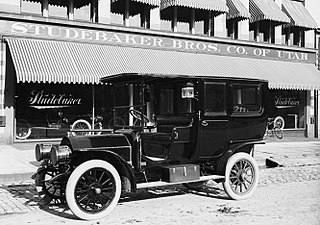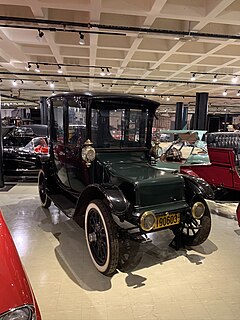
Studebaker was an American wagon and automobile manufacturer based in South Bend, Indiana. Founded in 1852 and incorporated in 1868 as the Studebaker Brothers Manufacturing Company, the firm was originally a coachbuilder, manufacturing wagons, buggies, carriages and harnesses.

The Hudson Motor Car Company made Hudson and other branded automobiles in Detroit, Michigan, U.S., from 1909 to 1954. In 1954, Hudson merged with Nash-Kelvinator to form American Motors Corporation (AMC). The Hudson name was continued through the 1957 model year, after which it was discontinued.

Coupé de ville — also known as town car or sedanca de ville — is a car body style produced from 1908 to 1939 with an external or open-topped driver's position and an enclosed compartment for passengers. Although the different terms may have once had specific meanings for certain car manufacturers or countries, the terms are often used interchangeably.

A coachbuilder, or body-maker, manufactures bodies for passenger-carrying vehicles. Coachwork is the body of an automobile, bus, horse-drawn carriage, or railway carriage. The word "coach" was derived from the Hungarian town of Kocs.

Fleetwood Metal Body was an automobile coachbuilder formed on April 1, 1909. Its name derives from Fleetwood, Pennsylvania, home of the company at the start, and lived on for decades in the form of the Cadillac Fleetwood and various Fleetwood trim lines on Cadillac cars.

Gillig is an American designer and manufacturer of buses. The company headquarters, along with its manufacturing operations, is located in Livermore, California. By volume, Gillig is the second-largest transit bus manufacturer in North America. As of 2013, Gillig had an approximate 31 percent market share of the combined United States and Canadian heavy-duty transit bus manufacturing industry, based on the number of equivalent unit deliveries.
The Packard Patrician is an automobile which was built by the Packard Motor Car Company of Detroit, Michigan, from model years 1951 through the 1956. During its six years in production, the Patrician was built in Packard's Detroit facilities on East Grand Boulevard. The word "patrician" is Latin for a ruling class in Ancient Rome.

The Packard Custom Super Eight One-Eighty was introduced for the 1940 model year by the Packard Motor Car Company to replace the discontinued Packard Twelve as their top-of-the-line luxury model. The car was derived from the Packard Super Eight One-Sixty with which it shared the complete running gear including the in-line eight-cylinder, 356-cubic-inch (5,830 cc) engine that developed 160 horsepower. It was advertised as the most powerful eight-cylinder engine offered by any automobile manufacturer in 1940.. It was complemented and gradually replaced by the more modern looking and mid-level Packard Clipper in 1941 and integrated into the Super Eight after the war.

A limousine, or limo for short, is a large luxury vehicle driven by a chauffeur with a partition between the driver's compartment and the passenger's compartment.

The Rauch & Lang Carriage Company was an American electric automobile manufactured in Cleveland, Ohio, from 1905 to 1920 and Chicopee Falls, Massachusetts, from 1920-1932.

Iroquois Motor Car Company (1903–1907) was a manufacturer of automobiles in Syracuse, New York, and later, Seneca Falls, New York. The company was founded by John S. Leggett as Leggett Carriage Company and originally specialized in the production of automobile bodies.

Aaron T. Demarest was an American carriage manufacturer and automobile body manufacturer. He built carriages in New York City for forty-eight years and luxury automobile bodies for 6 years.
Briggs Manufacturing was an American, Detroit-based manufacturer of automobile bodies for Ford Motor Company, Chrysler Corporation and other U.S. and European automobile manufacturers.
The John B. Judkins Company of West Amesbury, Massachusetts, carriage and automobile body manufacturers built their first automobiles in the 1890s. West Amesbury, since re-named Merrimac, was an early center of American carriage-building.
Derham Body Company of Philadelphia was a custom coachbuilding company founded by Irish wheelwright Joseph Derham (1865-1928) in 1887 to make carriages. As automobiles became more popular their clientele asked Derham to provide bodies for their cars. It was claimed only New York's Brewster had a similar reputation.

Holbrook Company of Hudson, New York manufactured custom automobile bodies and their leading customer was Packard Motor Company.

The Waterhouse Company of Webster, Massachusetts were coachbuilders making high quality custom bodies for chassis supplied by the major automotive businesses.

Willoughby Company was a custom coachbuilding business in Utica, New York. The Willoughby family had been building carriages in Rome, New York for some generations but set up in Utica when they added town cars and limousines to their products. Though always building custom cars Willoughby also built relatively expensive car bodies in small production runs.
The Walker Body Company, a former carriage manufacturer based in Amesbury, Massachusetts, began manufacturing metal automobile bodies in 1911. It went bankrupt in 1930. The manufacturing site remains as the Walker Body Company Factory.
Biddle and Smart was a manufacturer of carriages and then automobile bodies based in Amesbury, Massachusetts. It started as a successful carriage manufacturer before making the transition to auto body manufacturer in 1905.














